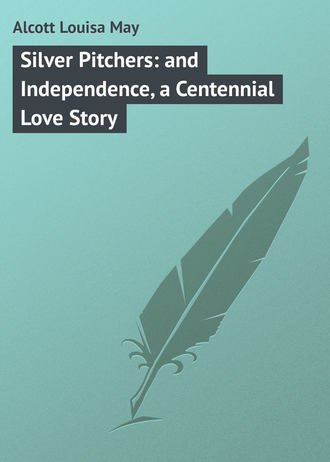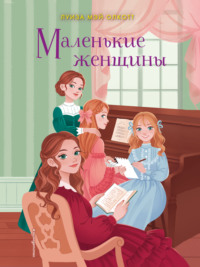 полная версия
полная версияSilver Pitchers: and Independence, a Centennial Love Story
"We won't!" cried Polly, firmly. "We began in play, but we will go on in earnest, and use our youth, our beauty, our influence for something nobler than merely pleasing men's eyes, or playing with their hearts. We'll help them to be good, and brave, and true, and in doing this we shall become better women, and worthier to be loved, I know."
"Why, Polly, you are quite inspired!" and Pris stopped in the snowy road to look at her.
"It isn't all my wisdom. I've talked with father as well as Ned and Phil, and they have done me good. I've discovered that confidence is better than compliments, and friendship much nicer than flirting; so I'm going to turn over a new leaf, and use my good gifts for higher ends."
"Dear thing, what a comfort you are!" said Pris, pressing Polly's hands, and looking into her bright face with grateful eyes. "You have given me courage to do my duty, and I'll follow your example as fast as I can. Don't come any farther, please: I'd better be alone when I pass Phil's window, for I'm going to nod and smile, as I used to in the happy time. Then he will see that I don't cast him off and leave him to 'go down' for want of help, but am still his friend until I dare be more."
"Now, Pris, that's just lovely of you, and I know it will work wonders. Smile and nod away, dear, and try to do your part, as I'm trying to do mine."
For an instant the little gray hat and the jaunty one with the scarlet feather were bent close together; but what went on under the brims, who can say? Then Polly trotted off as fast as she could go, and Pris turned into a certain street with a quicker step and a brighter color than she had known for weeks.
She was late, for she had lingered with Polly, and she feared that patient watcher at the window would be gone. No; the brown head was there, but it lay wearily on the arms folded over a big book, and the eyes that stared out at the wintry sky had something tragic in them.
Poor Phil did need encouragement, and was in the mood to take the worst sort if the best failed him, for life looked very dark just then, and solitude was growing unbearable.
Suddenly, between him and the ruddy sunset a face appeared, – the dearest and the loveliest in the world to him. Not half averted now, nor set straightforward, cold and quiet as a marble countenance, but bent towards him, with a smile on the lips, and a wistful look in the tender eyes that made his heart leap up with sudden hope. Then it vanished; and when he sprung to the window nothing could be seen but the last wave of a well-known cloak, fluttering round the corner.
But Priscilla's first effort was a great success; for the magic of a kind look glorified the dingy office, and every bottle on the shelves might have been filled with the elixir of life, so radiant did Phil's face become. The almost uncontrollable desire to rush away and recklessly forget his loneliness in the first companionship that offered was gone now, for a happy hope peopled his solitude with helpful thoughts and resolutions; the tragic look left the eyes, that still saw a good angel instead of a tempting demon between them and the evening sky; and when Phil shut up the big book he had been vainly trying to study, he felt that he had discovered a new cure for one of the sharpest pains the heart can suffer.
Next morning Pris unconsciously started for school too soon, so when she passed that window the room was empty. Resolved that Phil should not share her disappointment, she lifted the sash and dropped a white azalea on his desk. She smiled as she did it, and then whisked away as if she had taken instead of left a treasure. But the smile remained with the flower, I think, and Phil found it there when he hurried in to discover this sweet good-morning waiting for him.
He put it in the wine-glass which he had sworn never should be filled again with any thing but water, and sitting down before it listened to the little sermon the flower preached; for the delicate white azalea was Pris to him, and the eloquence of a pure and tender heart flowed from it, working miracles. One of them was that when sunset came it shone on two faces at the window, and the little snow-birds heard two voices breaking a long silence.
"God bless you, Pris!"
"God help you, Phil!"
That was all, but from that hour the girl felt her power for good, and used it faithfully; and from that hour the young man worked bravely to earn the respect and confidence without which no love is safe and happy.
"We are friends now," they said, when they were seen together again; and friends they remained, in spite of shrugs and smiles, ill-natured speeches, and more than one attempt to sow discord between them, for people did not understand the new order of things.
"I trust him," was the only answer Pris gave to all warnings and criticisms.
"I will be worthy of her," the vow that kept Phil steady in spite of the ridicule that is so hard to bear, and gave him courage to flee from the temptation he was not yet strong enough to meet face to face.
Portia and Polly stood by them stanchly; for having made her father's house a safe refuge, Portia offered Phil all the helpful influences of a happy home. Polly, with Ned to lend a hand, gave his comrade many a friendly lift; and when it was understood that the Judge, the minister, and the "Sweet P's" indorsed the young M. D., no one dared cast a stone at him.
All this took time, of course, but Phil got his reward at last, for one night a little thing happened which showed him his own progress, and made Pris feel that she might venture to wear the ring again.
At a party Phil was graciously invited to take wine with a lady, and refused. It was a very hard thing to do, for the lady was his hostess, a handsome woman, and the mother of a flock of little children, who all preferred the young doctor to the old one; and, greatest trial of all, several of his most dreaded comrades stood by to laugh at him, if he dared to let principle outweigh courtesy.
But he did it, though he grew pale with the effort to say steadily, —
"Will Mrs. Ward pardon me if I decline the honor? I am" —
There he stopped and turned scarlet, for a lie was on his lips, – a lie so much easier to tell than the honest truth that many would have forgiven its utterance at that minute.
His hostess naturally thought ill health was his excuse, and, pitying his embarrassment, said, smiling, —
"Ah! you doctors don't prescribe wine for your own ailments as readily as for those of your patients."
But Phil, angry at his own weakness, spoke out frankly, with a look that said more than his words, —
"I cannot even accept the kind excuse you offer me, for I am not ill. It may be my duty to order wine sometimes for my patients, but it is also my duty to prescribe water for myself."
A dreadful little pause followed that speech; but Mrs. Ward understood now, and though she thought the scruple a foolish one, she accepted the apology like a well-bred woman, and, with a silent bow that ended the matter, turned to other guests, leaving poor Phil to his fate.
Not a pleasant one, but he bore it as well as he could, and when his mates left him stranded in a corner, he said, half aloud, with a long breath, as if the battle had been a hard one, —
"Yes, I suppose I have lost my best patient, but I've kept my own respect, and that ought to satisfy me."
"Let me add mine, and wish you health and happiness, dear Phil," said a voice behind him, and turning quickly he saw Pris standing there with two goblets of water, and a smile full of love and pride.
"You know what that toast means for me?" he whispered, with sudden sunshine in his face, as he took the offered glass.
"Yes; and I drink it with all my heart," she answered, with her hand in his.
CHAPTER VI.
HOW IT ENDED
The leaven dropped by three girls in that little town worked so slowly that they hardly expected to do more than "raise their own patty-cakes," as Polly merrily expressed it. But no honest purpose is ever wasted, and by-and-by the fermentation began.
Several things helped it amazingly. The first of these was a temperance sermon, preached by Parson Snow, which produced a deep impression, because in doing this he had the courage, like Brutus, to condemn his own son. The brave sincerity, the tender earnestness of that sermon, touched the hearts of his people as no learned discourse had ever done, and bore fruit that well repaid him for the effort it cost.
It waked up the old people, set the young ones to thinking, and showed them all that they had a work to do. For those who were down felt that they might be lifted up again, those who were trifling ignorantly or recklessly with temptation saw their danger, and those who had longed to speak out now dared to do it because he led the way.
So, warned by the wolf in his own fold, this shepherd of souls tried to keep his flock from harm, and, in doing it, found that his Christianity was the stronger, wiser, and purer for his humanity.
Another thing was the fact that the Judge was the first to follow his pastor's example, and prove by deeds that he indorsed his words. It was hard for the hospitable old gentleman to banish wine from his table, and forego the pleasant customs which long usage and many associations endeared to him; but he made his sacrifice handsomely, and his daughter helped him.
She kept the side-board from looking bare by filling the silver tankards with flowers, offered water to his guests with a grace that made a cordial of it, and showed such love and honor for her father that he was a very proud and happy man.
What the Judge did was considered "all right" by his neighbors, for he was not only the best-born, but the richest man in town, and with a certain class these facts had great weight. Portia knew this, and counted on it when she said she wanted him on her side; so she exulted when others followed the new fashion, some from principle, but many simply because he set it.
At first the young reformers were disappointed that every one was not as enthusiastic as themselves, and as ready to dare and do for the cause they had espoused. But wiser heads than those on their pretty shoulders curbed their impetuosity, and suggested various ways of gently insinuating the new idea, and making it so attractive that others would find it impossible to resist; for sunshine often wins when bluster makes us wrap our prejudices closer around us, like the traveller in the fable.
Portia baited her trap with Roman parties, – for she had been abroad, – and made them so delightful that no one complained when only cake and tea was served (that being the style in the Eternal City), but went and did likewise.
Artful Polly set up a comic newspaper, to amuse Ned, who was an invalid nearly all winter, and in it freed her mind on many subjects in such a witty way that the "Pollyanthus," as her brother named it, circulated through their set, merrily sowing good seed; for young folks will remember a joke longer than a sermon, and this editor made all hers tell.
Pris was not behindhand in her efforts, but worked in a different way, and got up a branch society among her little pupils, called "The Water Babies." That captivated the mothers at once, and even the fathers found it difficult to enjoy their wine with blue eyes watching them wistfully over the rims of silver mugs; while the few topers of the town hid themselves like night-birds flying from the sun, when, led by their gentle General, that little army of innocents marched through the streets with banners flying, blithe voices singing, rosy faces shining, and childish hearts full of the sweet delusion that they could save the world.
Of course the matrons discussed these events at the sewing-circle, and much talk went on of a more useful sort than the usual gossip about servants, sickness, dress, and scandal.
Mrs. Judge waxed eloquent upon the subject, and, being president, every one listened with due respect. Mrs. Ward seconded all her motions, for this lady had much surprised the town, not only by installing Phil as family physician, but by coming out strong for temperance. Somebody had told her all about the girls' labor of love, and she had felt ashamed to be outdone by them; so, like a conscientious woman, she decided to throw her influence into the right scale, take time by the forelock, and help to make the town a safer place for her five sons to grow up in than it was then.
These two leading ladies kept the ball rolling so briskly that others were soon converted and fell into rank, till a dozen or so were heartily in earnest. And then the job was half done; for in a great measure women make society what they choose to have it.
"We are told that home is our sphere, and advised to keep in it; so let us see that it is what it should be, and then we shall have proved our fitness for larger fields of labor, if we care to claim them," said Mrs. Judge, cutting out red flannel with charitable energy, on one occasion.
"Most of us will find that quite as much as we can accomplish, I fancy," answered Mrs. Ward, thinking of her own riotous lads, who were probably pulling the house about their ears, while she made hoods for Mrs. Flanagan's bare-headed lasses.
"'Pears to me we hain't no call to interfere in other folks's affairs. This never was a drinkin' town, and things is kep' in fustrate order, so I don't see the use of sech a talk about temperance," remarked Miss Simmons, an acid spinster, whose principal earthly wealth consisted of a choice collection of cats.
"If your tabbies took to drinking, you would see the use, I'm sure," laughed Polly, from the corner, which was a perfect posy-bed of girls.
"Thank goodness, I've no men folks to pester myself about," began Miss Simmons, with asperity.
"Ah, but you should; for if you refuse to make them happy, you ought at least to see that they console themselves in ways which can work them no further woe," continued Polly, gravely, though her black eyes danced with fun.
"Well, that wouldn't be no more than fair, I'm free to confess; but, sakes alive, I couldn't attend to 'em all!" said Miss Simmons, bridling with a simper that nearly upset the whole bevy of girls.
"Do make the effort, and help us poor things who haven't had your experience," added Pris, in her most persuasive voice.
"I declare I will! I'll have Hiram Stebbins in to tea; and when he's as good-natured as muffins and pie can make him, I'll set to and see if I can't talk him out of his attachment to that brandy bottle," cried Miss Simmons, with a sudden yearning towards the early sweetheart, who had won, but never claimed her virgin affections.
"I think you'll do it; and, if so, you will have accomplished what no one else could, and you shall have any prize you choose," cried Portia, smiling so hopefully that the faded old face grew almost young again, as Miss Simmons went home with something better to do than tend her tabbies.
"We've bagged that bird," said Polly, with real satisfaction.
"That's the way we set people to work," added Portia, smiling.
"She will do what we can't, for her heart is in it," said Pris, softly; and it was pleasant to see the blooming girls rejoice that poor old Hiram was in a fair way to be saved.
So the year went round, and Thanksgiving came again, with the home jollity that makes a festival throughout the land. The day would not be perfect if it did not finish with a frolic of some sort, and for reasons of their own the young gentlemen decided to have the first sociable of the year an unusually pleasant one.
"Everybody is going, and Ned says the supper is to be water-ice and ice-water," said Polly, taking a last look at herself in the long mirror, when the three friends were ready on that happy evening.
"I needn't sigh now over other girls' pretty dresses, as I did last year;" and Portia plumed herself like a swan, as she settled Charley's roses in her bosom.
"And I needn't wonder who Phil will take," added Pris, stopping, with her glove half on, to look at the little ring back again from its long banishment in somebody's waistcoat pocket.
Never had the hall looked so elegant and gay, for it was charmingly decorated; couches were provided for the elders, mirrors for the beauties, and music of the best sounded from behind a thicket of shrubs and flowers. Every one seemed in unusually good spirits; the girls looked their loveliest, and the young men were models of propriety; though a close observer might have detected a suspicious twinkle in the eyes of the most audacious, as if they plotted some new joke.
The girls saw it, were on the watch, and thought the secret was out when they discovered that the gentlemen of their set all wore tiny pitchers, hanging like orders from the knots of sweet-peas in their button-holes. But, bless their innocent hearts! that was only a ruse, and they were taken entirely by surprise when, just before supper, the band struck up,
"Drink to me only with thine eyes;"
and every one looked smilingly at the three girls who were standing together near the middle of the hall.
They looked about them in pretty confusion, but in a moment beheld a spectacle that made them forget themselves; for the Judge, in an impressive white waistcoat, marched into the circle gathered about them, made a splendid bow, and said, with a smile that put the gas to shame, —
"Young ladies! I am desired by the gentlemen now present to beg your acceptance of a slight token of their gratitude, respect, and penitence. As the first man who joined the society which has proved a blessing to our town, Mr. William Snow will now have the honor of presenting the gift."
Then appeared Mr. William Snow, looking as proud as a peacock; and well he might, for on the salver which he bore stood a stately silver pitcher. A graceful little Hebe danced upon the handle, three names shone along the fretted brim, and three white lilies rose from the slender vase, – fit emblems of the maiden founders of the league.
Arriving before them, Master Will nearly upset the equilibrium of his precious burden in attempting to make a bow equal to the Judge's; but recovered himself gallantly, and delivered the following remarkable poem, which the public was expected to believe an emanation of his own genius: —
"Hebe poured the nectar forthWhen gods of old were jolly,But graces three our goblets fill,Fair Portia, Pris and Polly.Their draughts make every man who tastesHappier, better, richer;So here we vow ourselves henceforthKnights of the Silver Pitcher."ANNA'S WHIM
"Now just look at that!" cried a young lady, pausing suddenly in her restless march to and fro on one of the wide piazzas of a seaside hotel.
"At what?" asked her companion, lazily swinging in a hammock.
"The difference in those two greetings. It's perfectly disgraceful!" was the petulant reply.
"I didn't see any thing. Do tell me about it," said Clara, opening her drowsy eyes with sudden interest.
"Why, young Barlow was lounging up the walk, and met pretty Miss Ellery. Off went his hat; he gave her a fine bow, a gracious smile, a worn-out compliment, and then dawdled on again. The next minute Joe King came along. Instantly Barlow woke up, laughed out like a pleased boy, gave him a hearty grip of the hand, a cordial 'How are you, old fellow? I'm no end glad to see you!' and, linking arms, the two tramped off, quite beaming with satisfaction."
"But, child, King is Barlow's best friend; Kitty Ellery only an acquaintance. Besides, it wouldn't do to greet a woman like a man."
"Yes, it would, especially in this case; for Barlow adores Kate, and might, at least, treat her to something better than the nonsense he gives other girls. But, no, it's proper to simper and compliment; and he'll do it till his love gets the better of 'prunes and prisms,' and makes him sincere and earnest."
"This is a new whim of yours. You surely wouldn't like to have any man call out 'How are you, Anna?' slap you on the shoulder, and nearly shake your hand off, as Barlow did King's, just now," said Clara, laughing at her friend.
"Yes, I would," answered Anna, perversely, "if he really meant it to express affection or pleasure. A good grip of the hand and a plain, hearty word would please me infinitely better than all the servile bowing down and sweet nonsense I've had lately. I'm not a fool; then, why am I treated like one?" she continued, knitting her handsome brows and pacing to and fro like an angry leopardess. "Why don't men treat me like a reasonable being? – talk sense to me, give me their best ideas, tell me their plans and ambitions, let me enjoy the real man in them, and know what they honestly are? I don't want to be a goddess stuck up on a pedestal. I want to be a woman down among them, to help and be helped by our acquaintance."
"It wouldn't do, I fancy. They wouldn't like it, and would tell you to keep to your own sex."
"But my own sex don't interest or help me one bit. Women have no hope but to be married, and that is soon told; no ideas but dress and show, and I'm tired to death of both; no ambition but to outshine their neighbors, and I despise that."
"Thank you, love," blandly murmured Clara.
"It is true, and you know it. There are sensible women; but not in my set. And I don't seem to find them. I've tried the life set down for girls like me, and for three years I've lived and enjoyed it. Now I'm tired of it. I want something better, and I mean to have it. Men will follow, admire, flatter, and love me; for I please them and they enjoy my society. Very well. Then it's fair that I should enjoy theirs. And I should if they would let me. It's perfectly maddening to have flocks of brave, bright fellows round me, full of every thing that is attractive, strong, and helpful, yet not be able to get at it, because society ordains twaddle between us, instead of sensible conversation and sincere manners."
"What shall we do about it, love?" asked Clara, enjoying her friend's tirade.
"You will submit to it, and get a mental dyspepsia, like all the other fashionable girls. I won't submit, if I can help it; even if I shock Mrs. Grundy by my efforts to get plain bread and beef instead of confectionery."
Anna walked in silence for a moment, and then burst out again, more energetically than ever.
"Oh! I do wish I could find one sensible man, who would treat me as he treats his male friends, – even roughly, if he is honest and true; who would think me worthy of his confidence, ask my advice, let me give him whatever I have that is wise and excellent, and be my friend in all good faith."
"Ahem!" said Clara, with a significant laugh, that angered Anna.
"You need not try to abash me with your jeers. I know what I mean, and I stand by my guns, in spite of your 'hems.' I do not want lovers. I've had dozens, and am tired of them. I will not marry till I know the man thoroughly; and how can I know him with this veil between us? They don't guess what I really am; and I want to prove to them and to myself that I possess brains and a heart, as well as 'heavenly eyes,' a 'queenly figure,' and a 'mouth made for kissing.'"
The scorn with which Anna uttered the last words amused her friend immensely, for the petulant beauty had never looked handsomer than at that moment.
"If any man saw you now, he'd promise whatever you ask, no matter how absurd. But don't excite yourself, dear child; it is too warm for heroics."
Anna leaned on the wide baluster a moment, looking thoughtfully out upon the sea; and as she gazed a new expression stole over her charming face, changing its disdainful warmth to soft regret.
"This is not all a whim. I know what I covet, because I had it once," she said, with a sigh. "I had a boy friend when I was a girl, and for several years we were like brother and sister. Ah! what happy times we had together, Frank and I. We played and studied, quarrelled and made up, dreamed splendid dreams, and loved one another in our simple child fashion, never thinking of sex, rivalry, or any of the forms and follies that spoil maturer friendships."
"What became of him? Did he die angelically in his early bloom, or outgrow his Platonics with round jackets?" asked Clara.
"He went to college. I went abroad, to be 'finished off;' and when we met a year ago the old charm was all gone, for we were 'in society' and had our masks on."









